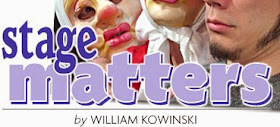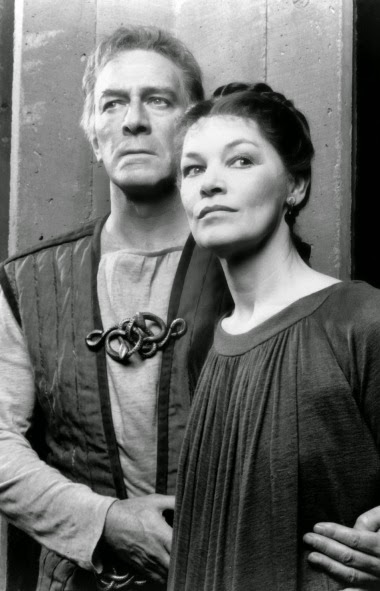Now I’m done with observing North Coast theatre, and it seems that North Coast theatre is done with me. Of all the people and theatrical organizations I wrote about in these retrospective posts, none have responded publicly or privately. I knew that was likely when I started this fairly arduous process of the past several months. But I console myself with one last theatrical gesture, quoting the last lines of Cyrano which I re-read in my review of the Northcoast Prep production: “But who fights ever hoping for success? I fought for lost cause, and for fruitless quest!…I know you now, old enemies of mine! Falsehood!..and Compromise! Prejudice! Treachery!…Folly—you? I know that you will lay me low at last!…Yet I fall fighting, fighting still!”
Yes, clearly in the end this was folly. But robbed of any sense of completion in the external world, I needed to complete it for myself.
This post brings down the curtain on this site’s concentration on North Coast theatre. I expect to be transitioning to other projects early in 2015, including online, and so I may continue to post here on other topics for awhile.
And when I move on I’ll be sure to leave some bread crumbs here. That’s mostly because, oddly, this site has gotten a number of new readers in the past couple of months, due to being linked in the “Elsewhere” column at Lost Coast Outpost for the first time. So onward, and maybe the links will follow.
This site will remain accessible, of course, as a resource for past writing on plays and productions. That’s how some visitors have been using it all along. There were days that more hits came from Europe than the North Coast.
I do have a piece of unfinished business, a postscript to my last post, on Shakespeare productions. Back several years, one of my Journal reviews was given a subhead I found objectionable. I hadn’t written it and hadn’t seen it before publication (so I subsequently added writing my subheads to my chores. And then selecting photos and writing their captions.)
The reference in question was to “trailer trash.” I objected to the term, in a letter to the editor (since that’s all that was open to me immediately) and here on this site. A letter to the editor complaining about something in my own column may have been a journalism first, but I was told that the letter was subsequently posted on at least one classroom bulletin board.
I expanded on my letter by quoting an anecdote about August Wilson: his gentle objection to a young playwright referring to her own background as "white trash." It is a very powerful point when made by the premier black playwright in American history, who had heard his share of demeaning names. Had he identified with them, his magnificent ten play cycle never would have even begun.
I know very well about those voices that get into your head. Coming from the white working class culture, the often-asked question--out loud as well as inside--of "who do you think you are?" echoes even if seemingly unheard.
Some may have found that criticizing a particular Shakespeare production for being set in a trailer park, and objecting to this term, were somehow contradictory. To believe that would be to misunderstand my review and point of view, reflexively ascribing it to some brand of snobbery. I mention this incident now because, first of all, the point of it remains important to me, and secondly, it may clarify a little more my particular brand of seriousness in doing this job.
My last retro reproduction is the column I wrote in early 2006, after my first predominately negative review of a show (see last post below.) It states my intentions and some background, and I don’t have many revisions to make on either.
My editors at the time requested this column because the paper published a passionate letter to the editor response to my negative review, written by one of the principals in the production (although not identified as such.) I don’t know for certain, but I sense that some people in the theatre community never forgave me for that review. I suppose it’s human nature to remember the bad reviews and not the positive ones, or the positive comments in a mixed review. Certainly the responses in letters to the editor etc. were almost always complaints. But I do believe that I at least reached a rapprochement with the person who wrote the letter, which even at the time I thought was witty.
A Life in the Theatre 2006
I wasn't bothered by the prospect of letters to the editor (though I recall none for the "positive" pieces). I had my say here, and others have theirs in the letters section. The dialogue is part of the point.
But I know how hard people work to create theatre. I've been involved in it since my third grade class put on the first play I wrote. In fourth grade I had my first and only rep company, when I wrote scripts for my Cub Scout den, and we blew away the other dens and their knot-tying demonstrations for the Pack prize every month.
I wrote, acted and directed in college, and I've seen my scripts produced occasionally since. I've been a dramaturge and otherwise involved as a participant or close observer of professional, college and community productions. I love the process. So I wasn't looking forward to the inevitable hurt feelings. Besides, [film reviewer]Charlie can say anything he wants about films in his column, but Steve Martin doesn't live here. They're unlikely to meet in Wildberries.
I also know that producers, directors and actors on the North Coast, as elsewhere, themselves make qualitative judgments, which can be quite harsh. They just don't often make them in public, and sign their names. Judgments are part of the process. Dealing with them is part of the job.
Some may feel that community theatre should essentially be immune from criticism, but those theatres still charge admission and ask for contributions. Evaluation is a reasonable element, as it is for the artistic growth of the theatres themselves. Producers know that they are competing for audience with other entertainment, including available versions of the plays they're producing, just as theatre artists learn from excellent productions, and are inspired by them.
As for my credentials, I offer this additional information: Like a lot of small town working class or lower-middle class kids, I didn't see live theatre as a child, but I've since seen hundreds of plays in at least 15 different cities and towns, from the back of New York restaurants to Broadway, and from the Guthrie in Minneapolis to summer barn theatre in central Pennsylvania, and at the Changing Scene in Denver, which was down an alley past a dumpster and an old washing machine. That's in addition to plays at all North Coast venues in the past nine years.
Although I've written on theatre for three newspapers and several national magazines, most of the time nobody was paying me to go. These gigs did provide the opportunity to talk at length with Jason Robards Jr., August Wilson and many younger theatre professionals. But that doesn't mean I'm the expert, or I can't be wrong.
Responses are individual. What I say doesn't prevent anyone from going to a show, nor should it deter anyone from feeling justified in enjoying it. But if I'm not honest about my own responses, what's the point?
Other things being equal, I'd rather not write about something I don't like. That's not always possible, and in last week's case I felt strongly about the play itself. I've seen Shakespeare's plays at every level and every sort of venue they're performed, up to and including Kevin Kline as Hamlet, and Glenda Jackson as Lady Macbeth. I don't expect New York or regional theater gloss at a community theatre. I am also dismayed by seeing a production there I'd expect to see in a high school, where the purpose is quite different.
I don't believe, as some do, that community theatres aren't capable of doing decent Shakespeare. But these plays probably require more time, attention and directed energies than other productions, and the best actors and directors in the community. The community deserves this. Great plays are great opportunities.
In my columns here so far, I've deliberately highlighted the particular pleasures of live performance, and of the process of creating it. My subtext has been that in addition to movies, music and other forms of art and entertainment, stage matters. My hope is to encourage a thriving theatre community. But healthy theatre requires self-criticism and self-analysis, and ever-greater aspiration. My contribution is to add information and context, and describe my responses.
All I'm finally doing is adding to the discussion, while providing something I hope is worth reading. I feel a responsibility to the community and to the participants, but also (and primarily) to readers, and to the plays themselves, and the life and future of the theatre. I try to balance those responsibilities.





































